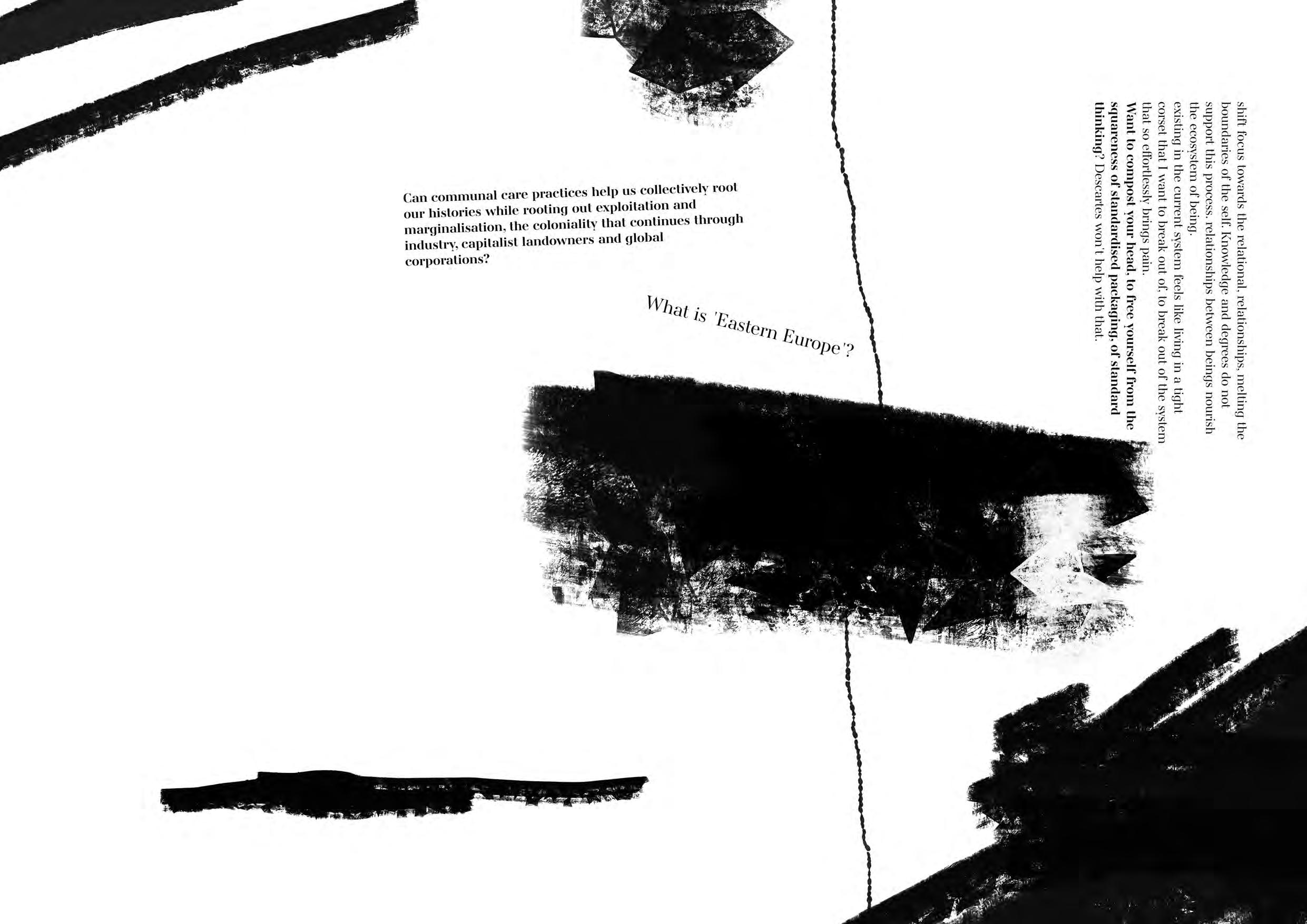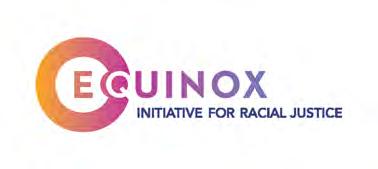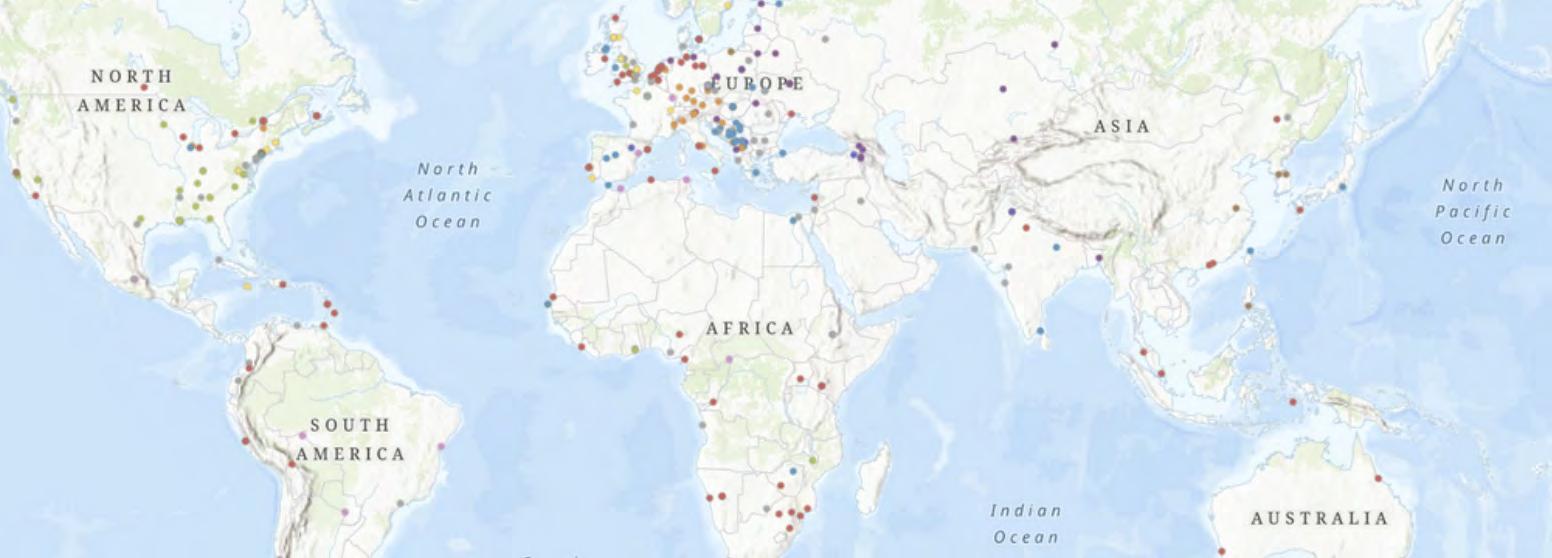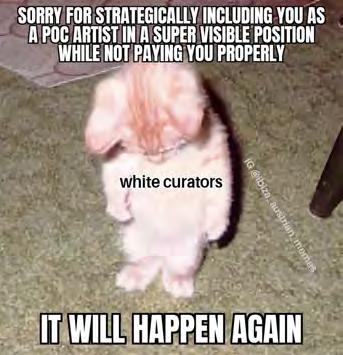The Decolonial Europe Day is a new initiative that uses the occasion of ‘Europe Day’ (9 May every year) to bring together existing decolonising initiatives, civil society organisations and other actors around the common project of decolonising Europe.



2023 booklet
The time to


decolonial europe day 2023 all rights reserved
1. Decolonial Europe Day: Subverting mainstream narratives about ‘Europe’ by the Decolonial Europe Day project team
2. questions are answers are questions by Alliance for Black Justice in Poland
3. What Does It Mean to Decolonize? by Paola Bacchetta
4. Make Decolonization About Decolonization Again by Aralez
5. Contribution by the European Network Against Racism (ENAR)
6. Decolonization is only possible if recognition goes hand in hand with justice and reparation! by African Futures Lab
7. To know our colonial heritage and to have a representation which reflect the European society we live in with all its diversity (ethnic; sexual; disability) is decolonizing Europe by #DiasporaVote!
8. Contribution by Equinox Initiative for Racial Justice
9. Décoloniser = arrêter le racisme ici et maintenant ! by Mireille-Tsheusi ROBERT
10. Demystifying decoloniality by the European Network of People of African Descent (ENPAD)
11. View of self-advocacy team member of the Greek Forum of Refugees by Moussa SANGARE
12. Lessons from Decoloniality Europe by Sandew Hira (DIN Foundation)
Table of contents
13. Decolonise 2.0 – a campaign by Hand in Hand against racism
14. WeDecolonizeVUB: a bottom-up approach in creating space for racialized students at the university by Daisy Van de Vorst and Latifah Abdou
15. Contested Histories in the Public Space by the Contested Histories Initiative
16. Contribution by Postmigrant Europe Project Team & Travellers
17. Contribution by the Decolonising Initiative at the European University Institute
18. decolonising ≠ decentring by EUROGLOT research network
decolonial europe day 2023 all rights reserved
by the Decolonial Europe Day project team
Decolonial Europe Day: Subverting mainstream narratives about ‘Europe’
European integration has traditionally been conceived as a ‘peace project’ that would prevent future wars between European nation-states. Each 9 May, the European Union commemorates the 1950 Schuman Declaration as ‘Europe Day’, when French minister of foreign affairs Robert Schuman put forward the plan to create the European Coal and Steel Community. However, as Hansen and Jonsson (2014: 31) have argued in their book Eurafrica: The untold history of European integration and colonialism, the “unification of Europe and a unified European effort to colonize Africa were two processes that presupposed one another. Africa could be developed only by Europe, and Europe could develop its fullest potential only through Africa”. Thus, mainstream narratives about European integration and peace to a large extent sideline the past and present of colonialism, and hence decolonial thinking and praxis. We live in a world where coloniality, which has survived colonialism, continues to perpetuate colonial powers and global hierarchies over previously colonised peoples. Eurocentrism, conceived as “the knowledge form of modernity/coloniality—a hegemonic representation and mode of knowing that claims universality for itself, ‘derived from Europe’s position as center” (Escobar, 2004: 217) remains dominant when thinking about democracy and ‘Europe’.
The Decolonial Europe Day is meant to subvert the mainstream narratives about ‘Europe’ by prioritising decolonial voices that answer, in different ways, the question “What does it mean to decolonise Europe?”. This question remains today more relevant than ever, given that “the world that was subjugated by Europe cannot examine issues in its present without taking into account how their past of having been colonised has determined their present and futures”. (Bhambra, 2022: 232). Recognising that decolonisation is an ongoing process, we do not aim to offer a single answer or to forge a consensus on this question, but rather to create a space for exchange and coalitionbuilding among people and initiatives with a variety of approaches to the question and common project of decolonising Europe. While the organisations and initiatives that got involved in this project so far represent a variety of the important decolonial work that is being done, there are many more important decolonial actors and initiatives out there, including in relation to fields of work that are not at all or insufficiently addressed by our initiative. Therefore, we express our wish for our initiative to (un)learn and grow over time, and to engage and work with more actors and initiatives in the process. With the ‘Decolonial Europe Day’ project, we aim to contribute to a shift in the narrative about Europe and its role in the world, and to co-create the conditions for restorative justice and a decolonial future for Europe and its supposed ‘others’ in global politics. The people and organisations that have contributed to the booklet are all actively pursuing decolonisation as a political horizon, and thus are able to provide inspiration and vision in that direction.

decolonial europe day 2023 all rights reserved
03
Our strategy for decolonising Europe is one that embraces pluralism. Knowing that the powers-thatbe can only maintain the current system through a politics of ‘divide and rule’ (including pseudopartnerships), the Decolonial Europe Day actively aspires to contribute to dismantling the currently existing and interrelated system(s) of domination and oppression by connecting (with pre-existing) actors, (un)learning and aligning strategies and actions. In doing so, we aim to politically challenge the system of Eurocentric, imperialist, white supremacist, capitalist heteropatriarchy – to borrow the term coined by bell hooks. While embracing pluralism, we are not ‘neutral’ or ‘impartial’ on the question of what it means to decolonise Europe, recognising that any claim to ‘neutrality’ or ‘impartiality’ only naturalises and reproduces inequity and injustice. We won’t organise discussions on whether reparations for colonialism are fitting, or whether Indigenous land should be repatriated. Instead, our aim is to stimulate discussion on how to make this possible. We side with Eve Tuck, K. Wayne and many others in arguing that “decolonisation is not a metaphor”, but an ongoing process to dismantle existing power structures. For one thing, this means that the material dimension of decolonisation is key. In the words of Frantz Fanon in The Wretched of the Earth, decolonisation is “a programme of complete disorder” that “sets out to change the order of the world”. We also recognise English as a colonial language and part of the workings of coloniality (Wa Thiong’o, 1986). For this reason we have consciously chosen not to edit the work of our contributors as a form of epistemic disobedience.

The project in general, and the booklet in particular, hopes to contribute to facilitate political education on (European) colonialism, past and present, create spaces for excluded (decolonial) voices on Europe, and Europe in relation to other parts of the world. By doing so, we aim to bridge across communities who wish to take responsibility for European colonialism, including existing anticolonial movements and groups, especially among Europeans with migrant backgrounds, while also connecting with anticolonial movements in the so-called “global South/s” [1] and their diaspora. This will help to stimulate our collective imagination to envision decolonial futures within and beyond Europe.
The Decolonial Europe Day project team is a group of people working together to facilitate the organisation of the Decolonial Europe Day, including the development of this booklet. The project team currently consists of seven people: Lena Strehmann (she/her), Mame Faye-Rexhepi (she/her), Eline Inghelbrecht (she/her), Joanna Pankowska (she/her), Alvaro Oleart (he/him), Aarti Narsee (she/her) and Maarten de Groot (he/him). For this booklet, we have invited a selection of civil society organisations and decolonising initiatives to share about their approaches/answers to the question “What does it mean to decolonise Europe?” by submitting a maximum of two pages of text and/or visuals. We have strived to include decolonial voices from different contexts and we will use this booklet as a starting point for conversations during the first edition of the Decolonial Europe Day, which will take place in online format on 9 May 2023 from 9:30-18:00 in South/Central African & Central European Summer Time. We want to thank Antonio Salvador M. Alcazar III for valuable comments on an earlier version of the above text. Finally, we wish to recognise the work of Gurminder K Bhambra as a key source of inspiration for the overall Decolonial Europe Day initiative, and we want to thank her for continuously supporting and collaborating with us since we started developing the idea for this project in the summer of 2022.
The Decolonial Europe Day project team
1 We recognise that the term ‘global South’ is contested, as it forms part of existing coloniality and the politics of ‘othering’. Guided by our partners, we use the term “global South/s”' to reflect the contested nature of the term and to refrain from monolithising conditions of ‘southerness’: https://www.southsouthmovement.org/about-us/
decolonial europe day 2023 all rights reserved
04
questions are answers
are questions answers?
Can we create a history of care practices that hel� us honour the land and our communities now, even if our communities were not in solidarity in the past?
Can communal care practices help us c� our histories while rooting out expl01tat1 marginalisation, the coloniality that con industry, capitalist landowners and glob
answer with questions to open space corporations? for possibility beyond what is already set in the words in (the) question

decolonisinglanguage
wordplays - more play, connection.more pleasure, surprise.. sensual language touching us with words moving us to the bones our lives depend on it

Does decoloniality have a synonym?
How do you perform epistemic disobedience?

Will mainstreaming decolonization liberate us?
Sorry is not enough.
[underrepresentation, marginalisation, discrimination - amplify, include, integrate]
Sorry, words are not enough.
coloniality, whitesupremacy, patriarchy, capitalism- intertwined violences
how can we talk about decolonisation when we don't want to talk about decolonisation?
how to talk about colonial violence without having to return to complex theoretical discourses? By dressing it up in academic narratives, do we not reproduce the same violence and exclusions?

Do we have to keep explaining these things? (Do we?!)
decolonising the body
Where does coloniality live in your body? It took away our dances. It made us sit on chairs, convinced us that this is civilisation.


What Does It Mean to
By Paola Bacchetta (Co-Coordinator, Decolonizing Sexualities Network)
The concept-term decolonize is one of the most beautiful in any of my languages. To even begin to consider its potentialities, it is first necessary to understand what exactly colonialism and coloniality are, and where and how.
Colonialism and coloniality are planetary. They saturate every dimension of life. They involve a plurality of actors, forms, strategies and tactics, and ongoing e ects.
Colonialism dates from the late fifteenth century. Its actors are: States, state institutions, militaries, capitalists, missionaries, academics, educators, writers, artists. Its forms are multiple: settler colonialism (such as in Turtle Island or what colonizers called North America, Abya Yala or what colonizers called central and south America, French Algeria, Guadeloupe); commercial colonialism (the British East India Company in India); administrative colonialism (France’s mandate in Morocco); occupation (i.e. Palestine, Kashmir); break-away colonialism (Brazil); etc.; and combinations thereof. Colonial strategies include: genocide; land theft; extraction of natural resources; displacement; destruction of economies and re-orientation to benefit the colonizer; degradation and toxification of the natural environment for extraction; enslavement or the violent theft, tra icking, sale and brutal exploitation of human beings; crushing the colonized’s culture, food systems, architecture, relationship to the land, way of life including spiritual practices, symbolic dimension, and their invasive replacement with the colonizer’s culture, food, habitations, way of life, religion or lack thereof; psychic ruin including via internalization of colonial values; erasure of precolonial history; invisibilization of indigenous populations via what Patrick Wolfe (2006) calls “the logic of elimination”; in some cases what Jin Haritaworn et. al. (2013) call “murderous inclusion” of subalternized populations (such as through “diversity” management); what I will call murderous exclusion (of colonized populations or parts thereof such as its queers, see below); epistemicide or the destruction of the colonized’ s languages, categories, logics, field of intelligibility, and the imposition of the colonizer’s language and entire episteme.
To decolonize Europe, we need to understand the immensity of material, economic, epistemic, psychic, social relational, cultural, symbolic, and spiritual devastation that colonialism and coloniality enact.
With an adequate understanding of what colonialism and coloniality entail, to decolonize Europe there are a million sites of entry, points of departure, paths to take. One is to redefine Europe itself to reflect a more accurate understanding of its present saturation in colonialism and coloniality. Franz Fanon wisely proposed that colonialism cannot be reduced to action done by active colonizers to passive colonized, but instead colonialism is a relationship that transforms both colonizer and colonized. It changes everyone’s entire life, way of thinking, feeling, being in the world. It alters materiality, from the land to bodies and corporeality. It reorganizes economic relations. It transmutes gender, sexuality and gender and sexuality relations. Both colonized and colonizer become other to themselves.

decolonial europe day 2023 all rights reserved
07
To decolonize Europe, we need to rethink the category Europe. It is most often used in a colonial-amnesiac way. It negates the existence of whole populations inside its physical and political territory: indigenous people such as the Sami in Sweden; Black people inside and across ancient and present Mediterranean Europe; Black and Asian populations – such as in Guadeloupe, Martinique, The Reunion - who have been French for centuries. Today, across Europe, including in France, postcolonial populations that have been citizens for generations are still not considered European because of ongoing colonial-racialization.
To decolonize Europe requires reconceptualizing in more accurate terms how Europe remains saturated in colonial relations of power, and how it continues to uphold colonial relationality across the planet. To focus on any dimension of coloniality is to ultimately reveal its relationality to a world of other dimensions and registers (Bacchetta 2020).

For example, the Decolonizing Sexualities Network that I co-direct with Sandeep Bakshi enters decolonizing through a focus on gender and sexuality. As the work of Maria Lugones (2008) amply shows, in many colonized spaces colonialism inflicted the colonizer’s gender binaries (man vs woman, masculinity vs. femininity). In turn, Oyeronké Oyewumi’s (1997) study of the Igbo in West Africa demonstrates that elsewhere colonizers completely introduced the notion and practice of gender where it did not previously exist. In a plethora of colonial contexts queer genders and sexualities were marginalized and punished. For instance, the British outlawed homosexuality in over 50 countries. Everywhere colonialism disrupted and worsened the conditions of women, queers and transgender people. Many steps in this direction are currently unfolding. It is apparent in an array of analytics of colonialism currently being generated. We see it in work to uncover queer languages that have survived (Garaoun 2022). We find it happening in studies of how populations become gendered subjects beyond coloniality, in reference not to a colonial episteme, not to its reductive modes of becoming subjects, but instead in relation to rituals that may implicate animals and the environment (Di Pietro 2020). Such work provides important stepping stones to understand what was and is, to open up what can be.
In sum, today, decolonizing entails an accurate, deep understanding of colonial damage and innovative resistance, an assessment of what continues to survive colonial damage and to even thrive, an accounting for what has been invented for life all along, and – not a going back to but rather – a movement forward, together, towards social transformation, towards the creation of a different, radically free futurity.
Paola Bacchetta (University of California, Berkeley, US) is one of the two Co-Coordinators of the Decolonizing Sexualities Network (DSN). DSN is a transnational collectivity that brings together academics, activists and artivists from across the global norths and souths for whom colonialism, coloniality and decolonization are central to the analytics, politics, experiences, and movements of gender and sexuality, and vice versa.
References Cited
Bacchetta, Paola. 2020. Decolonial Sexualities. Interventions: International Journal of Postcolonial Studies. Special Issue on Decolonial Trajectories, co-edited by Sandeep Bakshi, Suhraiya Jivraj, Silvia Posocco, Vol 22:4, Spring, 574-585. Di Pietro, PJ. 2020. Ni humanos, ni animales, ni monstruos: la decolonización del cuerpo transgénero. Eidos: Revista de Filosofía 34: 254-291.
Garaoun, Massinissa. 2022. A wīl-i žṛāhīm! An Introduction to a Moroccan Queer Language: Həḍṛāt əl-Lwāba. Decolonizing Sexualities Network Blog https://decolonizingsexualities.org/blog/a-wl-i-hman-introduction-to-a-moroccan-queer-language-ht-l-lwba Haritaworn, Jin, Adi Kuntsman and Silvia Posocco. 2013. Introduction: Murderous Inclusions. International Feminist Journal of Politics. Vol. 15, Issue 4: 445-452. Lugones, Maria. 2008. “The Coloniality of Gender.” In The Worlds & Knowledges Otherwise Project, edited by Manuela Boatcă. Vol. 2, Dossier 2: On the De-Colonial (11): Gender and Decoloniality. Online at: https://globalstudies.trinity.duke.edu/wko-v2d2
Oyěwùmí, Oyèrónkẹ. 1997. The Invention of Women: Making an African Sense of Western Gender Discourses. Minneapolis: University of Minnesota Press. Wolfe, Patrick 2006. Settler Colonialism and the Elimination of the Native. Journal of Genocide Research, 8(4), December, 387–409.
decolonial europe day 2023 all rights reserved
08
M ake Decolonization About Decolonization
Again
Could it be that we have Eurocentric practices and notions of decolonisation in our anti-racism and decolonisation movements in Europe?
by Max Arto de Ploeg from Aralez
Before we can answer this main question, it is important to ask ourselves: what was the location and intention behind the term decolonisation as it was first popularised and used? Obviously the term was originally used from the geographic location and positionality of former (and present-day) colonies. These places intend(ed) for gaining their independence and the right to self-determination. As more and more nation states have gained formal ‘flag independence’ the term decolonisation has found new meanings and uses over the last decades. But do we run the risk of appropriating the term when we use it inside the European context? And is the original aspiration for the right to selfdetermination of oppressed people in the global South compatible with diversity and inclusion politics inside Europe?
Inside Europe we see that the term decolonisation is often used to improve the situation of minority groups inside Europe. The term decolonisation makes visible how colonialism has shaped institutional racism and forms of exclusion. Initiatives are aiming more for inclusivity in all kinds of institutions such as companies, universities, musea, police, education etc. with more and more commemoration initiatives surrounding our colonial ‘history’ (as if it is a distant past). However, the usage of the term decolonisation inside Europe rarely seems to be connected anymore to the global struggle for the liberation of oppressed and colonised peoples. Is this not a fundamental rupture with the original meaning, location and intention of the term?
We can observe this effect possibly because there has been a decline of socialist, internationalist and anti-imperialist movements over the last decades, with an increased neo-liberalisation and individualisation of our social movements and their demands. To give a Dutch example; The Black Manifest which was the main manifest that came out of the recent Black Lives Matter protests, defined decolonisation as “Removing obstacles and exclusion mechanisms for black Dutch people within public and private organisations in society”. Thus explicitly defining the term decolonisation to be mainly about improving the position of Black individuals to participate equally inside the colonial metropole of the Netherlands. But do we realise enough that a (more) inclusive colonial system, potentially, still is a colonial system?
In previous decades we could see that all radical thinkers (also from the global north) had a more socialist, radical anti-imperialist or at least internationalist view by consistently connecting their own social struggle to that of the global liberation of oppressed people. Be it Martin Luther King’s Vietnam speech, Anton de Kom, Aime Cesaire, Frantz Fanon, Assata Shakur or Malcom X. They were all very aware and willing to connect their own struggle in the global north to the struggles of that in the global south.

decolonial europe day 2023 all rights reserved
09
As Malcom X explained in a talk we should go from civil rights to human rights; ‘we cannot go for civil rights within the jurisdiction of the United states as a domestic problem, while not also struggling for the rights of Africans inside Africa, that is why we should move from civil rights to human rights and to make it a global problem’.

Not only are present day social movements not connecting decolonisation to global struggles anymore, also institutions are making use of this neo-liberal and individualistic form of emancipation. We can see a striking example of this today in the campaign “Humans of CIA”. The campaign is created as intersectional as possible by actively ticking off different diversity boxes ranging from disability, to gender, to LGTBQIA+ community, LatinX, Black and Asian experiences by promoting their awareness and inclusivity of the company. The campaign of course is not addressing US imperialism in the global south and the role of the CIA in it. We can see this pink, black, decolonial- washing all over the place. Across the anti-racist movement we still see a lot of Obama fans while he has actively served the white house and US imperialist interests on a global level. This ignores for instance the fact that he bombed and cooped an African Country in his first year of his presidency and that he dropped an average of 72 bombs per day in 2016, had more foreign military operations then than the Bush administration and deported more refugees and migrants then did the Donald Trump administration.
As Angela Davis warned us in a 2008 speech on diversity; “it seems that the term diversity has colonized all of our struggles for social justice. When you only do the visible dimension of diversity you might end up with a group that is more conservative than the white people you try to diversify. Until we combine diversity with social justice, we end up with diversity that makes no difference at all” I would argue that by now this neo-liberal diversity and inclusion politics is also becoming inflated with the term decolonisation inside of Europe. As a consequence, we forget to connect the term with its original location and aspirations behind it. We rarely ask how your own individual position within the European system is affecting the collective rights of peoples and cultures in the global south. Decolonisation seems to have become about bettering the individual rights of minority groups within European systems instead of the promotion of collective rights of oppressed people globally.
It is thus important to highlight the difference between neo-liberal diversity and inclusion politics that appropriate the term decolonisation that comes from the global south. Perhaps we must actively de-center ourselves in Europe and make sure that decolonisation efforts continue to forward demands that bring about systemic global change and not only a seat at the coloniser's table for minority groups. An inclusive colonial system is still a colonial system. Diversity and inclusion politics can be useful for the global efforts of decolonisation if it becomes a tool for the right to self-determination of oppressed people across the globe.
Max Arto de Ploeg is a community builder, grassroot organizer, moderator, musician, teacher, and public speaker. He is a cofounder of Aralez, a decolonial organization and network based in Amsterdam in which he is project coordinator for the monthly Decolonial Learning Sessions, Indigenous Liberation project and the yearly Decolonial Reparations conference. Next to this he is the project-leader of the yearly Week Against Racism and Together Against Racism coalition in Amsterdam.

decolonial europe day 2023 all rights reserved
10
C ontribution by the European Network Against Racism (ENAR)


2020 was a critical and a pivotal year for anti-racism. For the first time in a long time anti-racism was top of the agenda for governments and institutions across Europe. Many started to understand what is required to pay more than lip service to anti-racism and start working to combat structural racism. ENAR is the voice of the anti-racism movement in Europe, and it is crucial that we continue to participate in these political spheres to drive this work, and to shape the narrative when it comes to racial justice in Europe. A recurring theme in ENAR's work is to raise some important questions regarding how we view justice, and how we can promote anti-racist and decolonial models of justice to empower our Network. The ENAR Network has come together to have strategic and decolonising conversations about what racial justice looks like, how anti-discrimination law can be used to support racialised people to access justice, and other ways to access justice.
We are increasingly including not just an anti-racist perspective but anti-oppressive analytical framework. This is most significantly addressed in our work on climate justice. To decolonise climate action means to accept that the climate crisis is deeply embedded in Europe’s particular racist, (neo)colonial capitalist history and thus indicates the solutions and actions we as societies undertake. It meansmakingafundamentalcommitmenttoBlackLivesMatter,andbyextensiontotheanti-racistidea that all racialised lives, including indigenous, refugee and migrant lives, matter. It means making a fundamental commitment to decolonisation, and to undoing all the structure that hold (neo)colonialism up, in the past and present. We have started this work by uncovering the realities of racialised communitiesandtheirresponsestotheclimatecrisis.Engagingwiththesecommunities’specifichistories of oppression and struggle is the true starting point forfurtheraction.
In the wake of the wave of right wing/far right governments winning elections in Europe, we see even moreurgencyinourworkwithournetworktocounterthefarrighttacticsandneo-colonialapproaches in the run up to the European Elections in 2024.
ENAR is the only pan-European anti-racism network that combines advocacy for racial equality and facilitating cooperation among civil society anti-racism actors in Europe. The organisation was set up in 1998 by grassroots activists on a mission to achieve legal changes at European level and make decisive progress towards racial equality in all EU Member States.

decolonial europe day 2023 all rights reserved
11
By African Futures Lab
only possible if recognition goes hand in hand with justice and reparation!
For AfaLab, decolonizing Europe means coming out of denial about history and recognizing that the majority of Western European countries, their institutions, their socio-political and economic systems, were built on the brutal domination of and violence towards non-white populations.
To decolonize Europe is also to recognize that the o icial end of colonization did not lead to the end of this political, economic, and cultural domination. Rather, this historical and structural violence continues to be perpetrated under other paradigms, such as that of development.
The decolonization of Europe is therefore only possible if there is a recognition of the past and of the ways in which this past has not passed. It is only possible if recognition goes hand in hand with justice and reparation for the violence inflicted on individuals and communities, and for the political and economic subordination imposed on formerly colonised States
The African Futures Lab pursues the recognition and the reparation of past and contemporary structural racial inequalities through the development and exchange of rigorous and empirically grounded knowledge across Africa and Europe. The knowledge generated through this work is fed into, and further refined by, ongoing efforts by activists and policy makers. AfaLab achievesthisby:

1)Investigating historical and contemporary racial injustices, as well as potential solutions, using field surveys, analysis of statistical information and archives; the results of this research are published in detailed research reports.

2)Supporting the e orts of racial justice actors to hold States and private actors accountable by generating empirically-grounded recommendations.
AfaLab was confounded by Dr Liliane Umubyeyi (Executive Director) and Dr Amah Edoh (Director of Research and Learning) and collaborates with a team of 12 racial justice experts and activists in Africa, Europe and North America.
decolonial europe day 2023 all rights reserved
Decolonization is
12
by #DiasporaVote!
Whether it be directly or indirectly, all European countries benefited from colonialism. Colonialism gave birth to capitalism and to racial classification of people and geopolitics. Our definition of colonialism is the capacity to take things and/or people which do not belong to you and forcefully make it yours. So, we should all proceed with a decolonial paradigm. Which means, to recognise the fact that European (and colonial) cultural hegemony shapes everything (opinions, institutions, practices, rationality…) because of a historical legacy.

There are many ways to decolonise Europe, for #DiasporaVote! it starts with: Education and Representation.
Because Europe is a cosmopolitan continent of nations, we should examine the implications of its imperial and colonial past. And for post-colonial minorities to be taken into consideration[1] they must be provided opportunity to take part in the political and economic development.
1)What does that mean to know your colonial history?
The larger colonial histories that have now come more sharply into view struck many Europeans as new, because school curricula have until recently either ignored these histories or o ered only self-flattering narratives of them.
To decolonise Europe we need to start by acknowledging and knowing our European colonial history. Through the education system a colonial European curriculum should be developed and integrated into all European education systems (6-18yrs). Just like we learned about World War I, II or how our national countries became a democracy; learning about colonisation, who did it; where; how we benefited from it and how this is linked to today's inequalities, poverty, racism, and discrimination towards minorities is a first step. By integrating this into a common European history; we take accountability and responsibility for what the previous generation did, we acknowledge that it happened and thus create a new history for decolonisation. In addition to the curriculum, we encourage schools to create safe spaces where students can learn and hear about this colonial history directly via the voices of people that have lived it, or people that are experiencing its impact. The curriculum could also be complemented via the use of development campaigns by students where they deconstruct stereotypes with fun and explicit ads. We also recommend projections of movies or documentaries[2] that depict this time to better illustrate to young people what was colonialism.
To decolonize Europe means that the role of governments, media and culture are essential. We want to see governments introduce a common European bank holiday that would mark the end of colonialism. This day should be a day where we remember what happened as well as the many human lives lost due to colonialism and slavery. On that day, the media should encourage learning through programmes dedicated toward the history of colonialism and slavery. Where links can be made between the history and the present[3]. The culture world should continue to engage in projects of decolonising the memory[4] and be presented within the various cultural institutions in various forms.
To know our colonial heritage and to have a representation which reflects the European society we live in with all its diversity (ethnic; sexual; disability) is decolonizing Europe.
decolonial europe day 2023 all rights reserved
13
And finally; to decolonise Europe the private sector must take action to create culture inside their workforce which boost diversity; stand against racism and discrimination and so just like many companies now acknowledge and often marque the 8th of march (The international Women’s Day) by creating awareness activities and conversation regarding gender inequalities; we would also see having the same to mark the end of colonialism and slavery. Of course, this will not be an easy task nor comfortable conversation to have but it is necessary
To ensure that, the above actions are not done in vain; we need to decolonise European Culture Memory. Some European politicians praise the merits of colonization as if there was a positive legacy of this imperial, economic, social, cultural, and political domination. So, we want to see the promulgation at European level of a Memory law for Europe[5]. To decolonise Europe ‘Memory laws’ enshrine state-approved interpretations of crucial historical events and promote certain narratives about the past, by banning, for example, the propagation of totalitarian ideologies or criminalising expressions which deny, grossly minimise, approve, or justify acts constituting genocide or crimes against humanity, as defined by international law
2)What do we mean by a representation which reflects society?
#DiasporaVote![6] is an initiative aiming at offering more representation and inclusion to racialised communities living in Europe. Our goal is for the diaspora to be more active in politics and voting, we support diaspora members as they carry the voices of their local communities to the table of higher-level decision-makers. We dream of a Europe where Members of the European parliaments can better represent the racialised diaspora living in Europe and vote policies ensuring the protection of their rights as European citizens. So, our action to decolonise Europe lay in the implementation of various activities and direct engagement between EU representatives and our communities and that using an intersectionality approach. We work towards the mobilisation and education of our community so that we can help strengthen their voices; provide them the opportunity to provide inputs into areas which impact them; which they have expertise in. We decolonise institutions and lobbying organizations by ensuring representation and diversity in the panel discussion. We also work toward the participation of diaspora deaf youth in all Europeans activities which we provide or that are being provided by other organisations and institutions. We have also developed training[7] to help allies and provide them with tools, understanding and solutions to be partners with us in decolonising Europe.
Finall e believe that to decolonize Europe some challenges must be overcome: political resistance, media and financial.
Authors:
Contribution from #DiasporaVote! Education Team recommendations Contribution From Imtinen Abidi - #DiasporaVote! Fellow Contribution From Celine Fabrequette - #DiasporaVote! founderand manager
#DiasporaVote! was created in 2018 to counter the lack of recognition and adapted regulations towards the issues faced by ethnic minorities at EU level. Though they are European citizens and part of Europe as a whole, these minority groups remain at the bottom of the priorities of the EU agenda.
[1] representation, political participation, agency

[2] “Watch Humans Zoos : Enforced Silence” https://www.youtube.com/watch?v=POfyqBDM5CE , author Fogha Mc Cornilius Refem.
[3] cf. "I am Afro Greek: Black Portraiture in Greece" – Film Screening (22 min) With Adéọlá Naomi Adérèmí | Film Director
[4] take for example cf. “Programme de désordre absolu” Décoloniser le musée” by Françoise Vergès composed of Academic specialists, artists, activists, and museum professionals have engaged for at least two decades in the project of “decolonizing” the memory cultures that shore up European identity.
[5] (i.e French memory law “Loi Gayssot”)
[6] #DiasporaVote! Twitter: @DiasporaVote_EU

#DiasporaVote! Instagram : @diasporavoteeu
#DiasporaVote! Website: www.diasporavote.eu
[7] Check your Bias : how to become an anti-racism ally?
decolonial europe day 2023 all rights reserved
14
Europe was built on the bitter fruits of colonialism – the exploitation and extraction of people and resources in the Global South leading directly to the prosperity and advancement of the Global North today, at minimal cost to them.
In order to tackle the legacies of colonialism embedded in our institutions, or the material conditions that prop up discrimination and inequality, we must dismantle the entire structures of modern Europe. Beyond culture, media, and the contents of museums that, while crucial, obfuscate the roiling underbelly of the consequences of true decolonisation – the power shift away from a Euro-centric world and away from a single actor’s crushing dominion overwealth, resources and decision-making. Across all EU policy – on climate, migration, law enforcement, equality and justice – Equinox Initiative for Racial Justice is committed to the structural dismantling of racist, oppressive hierarchy. We move beyond discourses of “hate” and harm at the level of the individual; we focus on changing structureslegislation, policies and institutions.

But our greatest challenge to decolonising Europe is ensuring the full participation and inclusion of racialised communities in policymaking. True change cannot be realised without racialised people and communities at the centre of all decisions, laws and policies affecting us. Without a process of true decolonisation, the EU’s Anti-racism is meaningless. And representation alone cannot undo centuries of deeply embedded colonial conditioning within racialised communities and in widersociety. It is simply the start of confronting white supremacy.
Decriminalise ourexistence. Defund the structures that oppress us.
That is how we decolonise Europe.
decolonial europe day 2023 all rights reserved 15
Explaining hard facts about European colonialism
A meme template of Charlie from It's Always Sunny in Philadelphia who is pointing energetically towards a wall covered in printed documents connected by a web of red threads. The overlaid text reads: How I feel when I'm explaining hard facts about how European colonialism never really ended, where the Global North countries have drained 152 trillion dollars worth of wealth from the Global South since the 1960s through monopoly control of commodity prices, rent, neo-liberal structural adjustment policies, unequal trade terms, extracting natural resources, militarised borders, illegal wars, arms deals, sanctions, the assassination of Global South leaders who wanted to nationalise resources, and monopoly on decision-making in the World Bank, International Monetary Fund, and World Trade Organisation.

Decolonise museums
A collection of stolen cultural heritage artefacts from around the world now displayed in museums across Europe, surrounding a plaque that reads "This museum is firmly committed to decolonisation, even though we have done nothing except put up this plaque saying we are." Next to each of the stolen artefacts a number of a footnote is shown, explanations of which are given at the bottom of this page.

Words: Stephanie Richani, Advocacy Lead, Equinox Initiative for Racial Justice
Images: Carrie Xin Hou, Communications Lead, Equinox Initiative for Racial Justice
Equinox Initiative for Racial Justice is a people of colour-led initiative working to advance rights and justice for all people in Europe. We work in solidarity with a coalition of racial and social justice leaders

1. Congolese artefacts held in the Africa Museum in Belgium, looted by General Emile Storms during violent colonisation of Congo; plans for possible restitution are slowly in the works if artworks can be shown to have been illegally obtained
2. Sacred Benin Bronzes held in the British Museum, looted during brutal occupation of Benin City (Nigeria) under British colonisation
3. Hip mask from Kingdom of Benin (Nigeria) displayed at Switzerland Museum; looted from Benin City when the Royal Palace was plundered by the British Army in 1897
4. Java man held at Naturalis Biodiversity Center in the Netherlands. Javaman is considered the first known specimen of Homo erectus, long considered a “missing link” between humans and apes. It was taken from Indonesia during Dutch occupation by a coloniser named Eugène Dubois. Dubois used forced Indonesian laborers for archeological excavation, many who died during the dig. Experts say that between 85 and 90 percent of the cultural heritage of Africa remains outside the continent.
decolonial europe day 2023 all rights reserved
and organisations to influence European Union law and policy.
16
Mireille-Tsheusi ROBERT
Activiste décoloniale


La Belgique face à ses activistes décoloniaux
L’éternel conflit entre le résultat et le processus.
Décoloniser, c’est cesser d’avoir peur des Noirs
Dans mon parcours d’activiste, j’ai régulièrement été confrontée à des personnes agacées ou dans l’incompréhension par rapport aux thématiques décoloniales. « Pourquoi ressassez-vous le passé ?
C’est derrière nous tout ça ! » : Tandis que l’incompréhension peut provenir d’une inconscience de l’existence et de l’impact du racisme envers les personnes anciennement colonisées par la Belgique (et plus largement « les Noirs »), l’agacement peut quant à lui être l’expression d’un racisme qui ne dit pas son nom. Et ce notamment face aux campagnes pour la justice postcoloniale lancée par Bamko et d’autres associations impulsées par des personnes Noires. Ces campagnes, dont certaines sont assez médiatisées sur le plan national et international, concernent notamment la restitution des biens culturels africains, la décolonisation du folklore, des manuels scolaires, du divertissement filmique, de la toponymie et de la statuaire urbaine. Cette montée de l’activisme provoque une peur politique des activistes Noires et Noirs, que l’on va dès lors juger comme étant « incontrôlables », « radicaux », « subjectifs », « communautaire », etc.
Décoloniser, c’est cesser d’avoir peur des blancs
J’ai compris que la parole du plus insignifiant ou minable des hommes blancs vaut plus que la mienne, en témoigne l’histoire du tueur en série Jeffrey Dhammer, pris au sérieux contre tout évidence et contre sa voisine Noire, témoin de faits troublants mais maintes fois ignorée par la police.
Par ailleurs, la quasi-totalité des figures d’autorités dans la vie socioculturelle, politique et professionnelle sont blanches. Je prends conscience que, comme bon nombre de Noires et Noirs de Belgique, j’ai moi aussi, développé une peur des blanc.he.s parce que les personnes qui ont un pouvoir, celui de favoriser ou de stopper mon dossier (pour un logement, un travail, un mariage mixte, un subside, un emprunt bancaire, …), sont quasiment toutes exclusivement blanches. Considérant la concentration du pouvoir et des privilèges dans cette catégorie de la population Belge, il est clair qu’il ne s’agit pas d’une peur de type xénophobe basée sur les stéréotypes et préjugés et qui donnerait lieu à des discriminations, mais bien d’une « peur politique » et en réaction au racisme vécu. Elle s’appuie sur des expériences personnelles, mais aussi sur les statistiques de la discrimination.

decolonial europe day 2023 all rights reserved
17
Décoloniser, c’est arrêter la discrimination structurelle
Les victoires amères des activistes Noires et Noirs
Dans une dynamique bien connue de récupération politique et mue par la « peur politique des Noirs », ces derniers sont exclus des processus d’implémentation décoloniaux qu’ils ont eux même enclenché. En effet, des parlementaires, des départements royaux, différents ministres et pouvoirs locaux se sont empressés de poser des actes tels que la promulgation de réglementations ou de lois, la formulation de regrets par rapport à la violence coloniale, le déboulonnement des statues, la restitution des objets, etc. Mais au lieu de crier victoire puisque l’objectif activiste est atteint, certaines militantes et certains militants vont garder un goût amer par qu’elles et ils ont été discriminé.e.s, exclu.e.s du processus censé œuvrer à leur réhabilitation : le travail mémoriel. Ces gens pensent avoir fait du décolonial en déboulonnant, certes. Mais tant qu’ils le font sans nous, en nous discriminant, le racisme colonial continue. C'est ce que j'appelle le racisme paradoxal : être discriminé.e par des personnes, dans des lieux ou par des processus justement censés réhabiliter les racisé.e.s.
Décoloniser, c‘est laisser éclore l’activisme comme processus émancipateur, réparateur


L’émancipation est un processus intérieur. Elle peut bien sûr s’appuyer sur des aides extérieures ou des « Allié.es blanc.he.s » mais il paraît difficile de libérer quelqu’un.e qui s’y refuse. L’idée est de canaliser les « sentiments » résultant de la blessure politique et historique (le racisme colonial) ainsi que les compétences de militantisme professionnel au service d’un dialogue socio-politique constructif. Ce processus instaure de fait un espace intellectuel collectif qui vise par exemple à définir cette blessure et son impact aujourd’hui, à élaborer des revendications ainsi que des méthodes garantissant que le débat ait lieu même dans un contexte belge de tabous postcoloniaux. Je postule que ce processus est émancipateur en soi car il est pensé et mis en œuvre par les afrodescendant.es eux-mêmes qui se confrontent à l’une de leur plus grande peur inconsciente : la « peur » des blancs. Et en miroir, ce processus amène progressivement la société belge à dépasser l’un de ces mépris social le plus partagé : le racisme envers les Noirs.
Militer contre le racisme lorsque l’on est Noire, c’est conjurer cette peur politique des blancs qui remonte à des siècles et qui a traversé des générations d’esclavagisé.e.s, de colonisé.e.s et de racisé.e.s contemporain.e.s. Cet objectif-là, personne ne peut le faire à notre place.
Mireille-Tsheusi ROBERT est présidente de Bamko asbl, un comité féministe et antiraciste. Formatrice sur les questions coloniales, raciales et féministes, elle est auteure et co-auteure de plusieurs ouvrages.

decolonial europe day 2023 all rights reserved
18
Demystifying decoloniality
The European Network of People of African Descent (ENPAD) is a coalition of pan-African civil society organizations across Europe that was founded in Berlin fall 2014 and registered in the UK. Our core mission is guided by the Durban Declaration and Program of Action as well as UN Permanent Forum for people of African descent. Accordingly, we mobilize our members to advocate within their respective EU member states for the implementation of the decade that commenced on 1st January 2015 and is ending on 31st December 2024, with the theme “recognition, justice and development”.
ENPAD champions European values of respect for human dignity, equal rights, social justice, diversity and inclusion by advocating for decolonization, liberation and self-determination for people of African descent. We address all manifestations of anti-Black racism, afriphobia, and racially-motivated violence whilst honoring our common humanity, interconnectedness and symbiosis with nature. We strive for an inclusive society in which all people have equitable rights and opportunities regardless of their origin, skin colour, gender, religious beliefs, sexual orientation and social status.

We believe that structural racism emanates from an unjust and illegitimate colonial ideology that was developed and refined by European elites over the past centuries to legitimize the extraction of the natural resources of their colonies. This ideology was anchored upon policies of indoctrination, propaganda and brainwashing to legitimize their exploitation, paternalism, dominance. Moreover, this legacy was accompanied by strategic dehumanization and violence of the colonized populace as well as systematic erasure of their epistemologies, normative values and world views.
The contemporary Western worldview is still influenced by this mindset of viewing nonwestern people from this colonial gaze such that existing power imbalances that foster structural racism are internalized and thereby perceived as being normal. This evolution of “othering” has paved the way for various manifestations racial exclusion such as afriphobia, islamophobia, anti-Roma, anti-semitism and anti-LGTBQI. Since people of African descent can be impacted by one or more of these manifestations, it is imperative to adopt an intersectional perspective that addresses the intersecting axes of structural exclusion.
Decoloniality and intersectionality are the fundamental guiding principle of our work ethic so as to counter the “taken-for-grantedness” of this Western worldview, to acknowledge the underlying colonial ‘roots’, to address the vacuum of exclusion and to advocate for structural change that has a durable impact. However, this is not an end in itself, but an ongoing process of learning, unlearning and re-learning these “normalized” misconceptions, imageries, mindsets and language that persist to date. We all have a shared responsibility to tackle racism because it impacts on all of us, albeit differentially, as targets, witnesses, bystanders and stakeholders. We thus advocate for equitable access to basic social amenities, basic human rights, recourse to legal protection, recognition of generational traumas, restitution for colonialism, enslavement and genocide.

decolonial europe day 2023 all rights reserved
19
1. The polarizing and separatist political discourse: There is a rise in an antithetical far-right right discourse that targets people of African descent, in the guise of the so-called woke-ism. This is exacerbated by unwarranted claims by the far-right of being “victims of racism” from cso’s advocating for anti-racism. This has legitimized and normalized the negative stereotyping of anti-racism activists as well as targets of racism as being “non-European”. In the wake of the upcoming European Parliament elections next year, it is imperative that MEPs adopt a zero tolerance to such polarizing smear campaigns as a first step towards achieving a Europe that is true to its values of equality, inclusion and diversity. Decolonial Europe should serve as a platform for decolonial policy-formulation and decision-making that incorporates historical and current power dynamics that are not only founded upon equity, solidarity and inclusion but also be foundational to a dialectical engagement to structural and sustainable change.
2. The continued use of colonial terminologies: these tend to frame the anti-racism discourse in a manner that does not necessarily resonate with the purported outcomes but rather has the counter-effect of exacerbating and/or normalizing the very stereotypes they set out to demystify (eg “equality” fails to account for the vacuum created by the many years of exclusion hence a preference for terms such as equity, reciprocity, mutuality…). Decolonial Europe should be a forerunner in devising and/or promoting research methodologies that are transversally intersectional, decolonial and pluriversal. A case in point is advocating for a critical analysis of obsolete terminologies used in policy formulation, grant applications, stipulated deliverables and aspired outcomes.

3. The contested veracity of desegregated equality data: this data relies principally on subjects’ self identification of their race and ethnicity without a universally acceptable or scientifically incontrovertible definition of these terms. The lack of common epistemic ground on conceptual terminologies could yield results that have the counter-effect of exacerbating and/or normalizing the very stereotypes they set out to measure. Decolonial Europe should be a forerunner in devising and/or promoting a multidisciplinary study on developing measurable indicators of otherwise non-measurable terms.
4. Flawed European laws: EU laws were designed for a predominantly White society but no longer serve the needs of contemporary Western society that is becoming increasingly super diverse but differentially protected by the law. Decolonial Europe should advocate for the ratification of obsolete laws that have the propensity of exacerbating the precarious status as targets of racism due to their inherent lack of decoloniality and intersectionality.
5. The lack of public representation: A need for European consultative mechanisms and/or advisory boards to the Human Rights council for people of African descent and any other relevant stakeholders mandated to address their safety, quality of life and livelihoods. Decolonial Europe should serve as a platform to archive legacies of colonisation inasmuch as they impact upon structural, institutional and systemic racism. It should hold member states accountable for “racial equity mainstreaming” by implementing decolonial policymaking and evidence-based actions that are structural and sustainable.
6. The lack of safety and wellbeing: civil society organizations are currently grappling with spaces that are shrinking at an increasingly disturbing pace due to defunding, deregularisation, deregistration and criminalisation. Decolonial Europe should amplify and support cso’s efforts in combatting racism by challenging and dismantling the skewed power relations as well as the contemporary vestiges (language, curriculum, legal frameworks, deontological codes, organizational structures, access to shared resources, representation in positions of power).
decolonial europe day 2023 all rights reserved Critical reflections and
concerns
20
V iew of self-advocacy team member of the Greek Forum of Refugees
Décoloniser l'Europe signifie pour moi que:
by Moussa SANGARE
-L’Europe doit reconnaître officiellement les crimes et l'injustice commis pendant les périodes coloniales . Exemple: (les crimes humains et les dégâts matériels).
-L’Europe doit ouvrir les archives aux historiens indépendants afin de faire la lumière et rendre la vraie justice aux victimes sur tous les crimes commis par l’Europe pendant la colonisation.
-L’Europe doit abandonner toutes les pratiques coloniales qui existent en 2023.
Comment appréhendez-vous le projet de décolonisation de l'Europe et que faut-il concrètement
Pour moi ,le projet de décolonisation de l'Europe est une excellente nouvelle pour toute l'humanité.
C'est un très beau projet que le monde entier attend depuis très longtemps. L’Europe doit reconnaître et demander pardon o iciellement pour ces crimes pendant la colonisation.
Pour réussir ce projet, il faudra d’abord commencer avec un dialogue international sincère sur les crimes commis par l’Europe avec tous les parties prenantes.
Ensuite identifier les crimes et les dégâts commis par l’Europe, rendre la vraie justice et indemniser les victimes de la colonisation européenne.
Comment le travail de votre initiative/organisation contribue-t-il à la décolonisation de l'Europe ?

Avec notre organisation , nous travaillons beaucoup plus sur la décolonisation des mentalités , en organisant des activités éducatives , culturelles et sportifs.

Nous participons aussi à plusieurs conférences nationales et internationales pour faire des plaidoyer sur le système d'immigration européen actuel qui est exclavagiste/coloniale.
Nous dénonçons les pratiques coloniale comme toujours décider pour les autres sans leur avis.
decolonial europe day 2023 all rights reserved
21
“What does it mean to decolonise Europe?”
Quels sont les principaux défis que vous identifiez (dans votre propre travail et au-delà) par rapport au projet de décolonisation de l'Europe, et comment suggérez-vous de les aborder ?
Les défis identifiés que je rencontre dans mon travail sont très énormes car je ne vois aucune volonté réelle de la part des décideurs européens pour la décolonisation de l'Europe.
Je vois que les politiques européens ont gardé leur posture colonial vis-à -vis des autres nations colonisées. Parfois j’ai l'impression que nous marchons sans bouger.
Voila quelque suggestions importantes que nous faisons pour aborder le sujet de la décolonisation:

• L’Europe doit commencer à la décolonisation économique , culturel , politique.
• L’Europe doit arrêter d'enseigner la colonisation comme une richesse d'Europe.
• L’Europe doit stopper l’oppression sur les autres peuples avec ces bases militaires.
• L’Europe doit voir ces anciens colonies comme des partenaires , non ces colonies.
• L’Europe doit rapatrier l’argent du continent africain.
• L’Europe doit respecter la culture et le savoir des autres peuples.
• L’Europe doit fermer tous les centres de détentions des réfugiés et migrants.

• L’Europe doit mettre à jour les livres et manuels scolaires actuels avec la vraie histoire de la colonisation et son rôle dans les crimes et dégâts commis à ces colonies.
• L’Europe , ces médias et ces Organisations Humanitaires Non Gouvernementales doivent arrêter de présenter les autres pays du tiers monde qu’avec des images catastrophiques ,de faim, de guerre , d'enfants affamés.

• L’Europe doit faire face à son passé colonial , restituer tous les biens volés sans exception à ces colonies.
• L’Europe doit permettre la libre circulation des personnes , doit arrêter de dire qui a droit de voyager et qui n’a pas de voyager.
• L’Europe doit décoloniser sa mentalité , ses médias , son administration , respecter la souveraineté de ces anciennes colonies et arrêter les relations coloniales avec ces anciennes colonies.
A votre avis, quels sont les aspects de la décolonisation de/en Europe qui ne retiennent pas suffisamment l'attention ?
A mon avis , tous les aspects de la décolonisation de/en Europe ne retiennent pas suffisamment l'attention. Je ne vois aucun effort sincère de la part de l'Europe pour envisager une véritable décolonisation .
Moussa SANGARE is President of the Ivorian Community of Greece and Member of the self-advocacy team at the Greek Forum of Refugees (GFR). GFR is a refugee-led organization based in Greece, consisting of refugee/ migrant communities, professionals and individuals. Its ultimate goal is the effective inclusion and integration of refugees/immigrants and asylum seekers in the host society. GFR has an advocacy project (and a related selfadvocacy team), the goal of which is to train refugees and migrants to advocate on their own.

decolonial europe day 2023 all rights reserved
22
Lessons from Decoloniality Europe
by Sandew Hira (DIN Foundation)
Introduction
In his frequent travels to different countries in Europe to lecture on decolonial knowledge Ramon Grosfoguel, professor at the University of California Berkeley, noticed that organizations and individuals in different European countries are working on the same themes along the same lines without knowing of each other’s existence. He decided to create a space where academics and activists could get to know each other by organizing a first conference under the name “Decoloniality Europe” (DE) in 2012 in Madrid. An informal network under the name of Decoloniality Europe was established in that year. It held a few international meetings. In December 2018 the name was changed to Decolonial International Network (DIN) and a formal entity - a foundationwas established in The Hague. The board members are Ramon Grosfoguel, Sandew Hira, Arzu Merali and Massoud Shadjareh. I was the field organizer of DE and currently of DIN. This article goes into the lessons we have drawn from Decoloniality Europe and DIN.
What kind of international network?
When likeminded people from different countries meet, there is a natural sentiment to get together and learn from each other. But when people with similar political ideas come together, the question of linking is a political question: what kind of network do we want to build? Is it a network of individuals, academics or organizations? DE was a mix of all of this. And that was also its weakness. Non-academic activists have different needs than academics. The first are focused on building political organizations and the latter on developing a narrative and sometimes building an academic career. Individuals without a formal organization have an informal network that still can be of great importance to the network.
Very soon we decided that the network should be a network of organizations. History has many examples of international networks that are anti-imperialist and anti-colonial: the Third International, the Pan-Africanist and Pan-Islamist movements. In 2016 European progressive movements found DIEM25, "a pan-European, progressive movement that aims to democratise the EU before it disintegrates." DIEM25 is focused on Europe. Together with Sanders Institute they founded in 2018 the Progressive International. Their mission is "to build a planetary front of progressive forces. We define progressive as the aspiration to a world that is: democratic, decolonised, just, egalitarian, liberated, feminist, ecological, peaceful, post-capitalist, prosperous, plural, and bound by radical love." It has decolonization in its mission. How does DE fits in this constellation? DE is specifically about decolonizing the world.
A big problem with the organizations of DE is commitment. Commitment is expressed in the resources (time, funds) that organizations are willing to spent in building an international network. Initially everybody is enthusiastic, but when it comes to put resources into building the infrastructure for this endeavor (website, newsletter, projects etc) it becomes very difficult. Many groups have limited financial resources.

decolonial europe day 2023 all rights reserved
23
What kind of activities?
Another problem is of a practical nature. What makes an international network really international? If they have joint international projects. We tried to set up such projects with organizing Genocide Memorial Day commemorating colonial genocides in January and annual Islamophobia conferences. It started well, but over the years it became problematic to keep organizing it as a joint initiative (using common theme's, doing common promotion). In our analysis there was a big problems related to this. That problem is a theoretical one. Decolonial theory has made great advances in epistemology and social theory, but less so in economic theory, political theory or world history. Liberalism and Marxism are comprehensive, coherent and integral frameworks that o er practical solutions for humanity, whether you like it or not. Market economy versus planned economy; parliamentary democracy versus socialist worker state, reform versus revolution, etc. Many activists can tell you what they are fighting against, but it is more di icult to argue what you are fighting for. Is it socialism or a decolonial world? How does a decolonial world look like?
A vision for the future

We tackled this problem by spending time to develop a comprehensive, coherent and integral framework for decolonial theory and practice. The result is published in a book titled Decolonizing The Mind. It argues for a new pluriversal world civilization that supersedes the old colonial world civilization. It takes on many issues including the issues of economics, politics and world politics.
Meanwhile we were confronted with people and institutions outside Europe who wanted to work with us on decoloniality. It compelled to think about the relationship between Europe and the global South. This led to a change in orientation. DE became DIN. An informal network was transformed in a formal institution in 2018: the DIN foundation. This was necessary because we saw that we need a judicial entity to engage in formal relations with established institutions through Memorandum of Understanding or contracts.
DIN has articulated a policy of establishing formal relations with organizations through MOU's. In this way we know which commitments are realistic and which are not. A MOU has a limited period (a year) with concrete activities and responsibilities. If the relationship works, we continue it. If not, we end it. Our aim is limited and modest: to get as many people as possible involved in developing decolonial theory and practice. It took Liberalism and Marxism hundreds of years to develop into comprehensive, coherent and integral frameworks with contributions from many thinkers. The decolonial movement is only a few decades old. We need to get many activists, artists and intellectuals involved in developing a comprehensive, coherent and integral framework. We are now in the process of building an educational and communication infrastructure based on the narrative of DTM in di erent parts of the world that can connect these people and organizations. We are open to work with everyone in realizing this infrastructure.
Sandew Hira is the Secretary of the Decolonial International Network Foundation (DIN Foundation). The DIN Foundation was established in The Hague, the Netherlands, in December 2018 as a formal institution. It was the follow-up of an informal network under the name "Decoloniality Europe". The aim of the foundation is to promote the development of decolonial theory and practice. Its main activity is the building of an educational infrastructure for decolonial theory and practice.

decolonial europe day 2023 all rights reserved
24
a campaign by Hand in Hand against racism
Under the slogan "Decolonisation is a story of us all", Hand in Hand against racism launched a new campaign in november 2022. The organisation wants to revive the term "decolonisation" and link it more clearly to contemporary structural racism. "Decolonisation is not only about Congo. In recent years, our colonial past has received a lot of attention, just think of King Philip's expression of regret and Belgium returning the tooth of assassinated Prime Minister Patrice Lumumba after so many years," says Lieven Miguel Kandolo , co-chairman of Hand in Hand Against Racism.
"We want to take further important steps towards decolonisation. This time in a series of important areas in our society that affect everyone. Here, we certainly do not want to limit ourselves to just changing colonial street names or statues, no matter how important these symbols are," Jihad Van Puymbroeck, co-chairman of Hand in Hand Against Racism further explains.
The campaign focuses on four concrete themes: Labour, Heritage, International Solidarity and Climate. Linked to each of these four themes are actions that Hand in Hand Against Racism wants to usetoappealto ordinary citizens to "help decolonise" and that includes some disarming images.
"Belgium leads Europe in open jobs... And in discrimination against job seekers based on ethnicity," the campaign image around the labour theme headlines. "Decolonising the labour market is about the right to decent work for all. Actions that fall under this include targets, field tests and an approach against racism in the workplace." says Van Puymbroeck.


–
decolonial europe day 2023 all rights reserved 25
The cost of the climate crisis for countries in the South provides a clear link to decolonisation. In this campaign, Hand in Hand Against Racism talks about a just climate transition. "The richest 10% of the world's population is responsible for 50% of total emissions. The effects of everaccelerating climate change are visible everywhere, but they are felt most strongly by the most vulnerable in countries in the South," Kandolo said. The campaign slogan therefore goes like this "We are concerned about climate... Especially in our own street."



Hand in Hand against racism works closely with other organisations and volunteers to carry out further concrete actions around the four themes. "Everyone can participate in our decolonisation plan. The aim is not to point fingers at "guilty parties", but rather to each take our responsibility to achieve a society where racism has no place," Kandolo concluded.
Hand in Hand Against Racism is a movement fighting against structural racism, racism that is embedded in our society. It strives for a society where all people have equal rights and opportunities and discrimination is eliminated.
Learn more about the campaign and Hand in Hand Against Racism: www.handinhandtegenracisme.be


decolonial europe day 2023 all rights reserved Beautiful
…. It cost millions of lives. 26
statue
a bottom-up approach in creating space for racialized students at the university
by Daisy Van de Vorst and Latifah Abdou
As a colonial institution the university is not suited to accommodate the realities of racialized students. Movements like #RhodesMustFall and #WhyIsMyCurriculumSoWhite are clear examples of this institutional failure. It furthermore demonstrates the harsh reality of racialized students not only having to function within an environment that isn’t suited to their realities, but even being burdened with the work to change the institution themselves. The burden placed on racialized students to work on this structural change is typically unpaid, and often emotionally and mentally abusive. Yet they are left with no other option, as the institution and its policy workers are detached from this reality. WeDecolonizeVUB, a project of the University Centre for Development Cooperation, therefore aims to redefine how this struggle for structural change can be approached. Instead of engaging in lobby and advocacy processes with the institution - where whiteness is centered - WedecolonizeVUB radically centers racialized students and their needs, interests and knowledge as a form of anti-racist struggle within the university. This is done through the WeDecolonizeVUB library that provides alternative knowledges, but at the same time serves as a physical space where racialized students can come together to exchange and interact. The library thus functions as an important physical, psychosocial, epistemological and symbolical space to combat the Western dominated structuresoftheinstitution.We areconvincedthatthebottom-upapproachofWeDecolonizeVUBwill impact policy in the longterm.
Daisy Van de Vorst and Latifah Abdou are project coordinators at the University Centre for Development Cooperation (UCOS). WeDecolonizeVUB is a project supported by UCOS by and for racialized youth in Brussels.
WeDecolonizeVUB: Research on Racism, Inequality and the Importance of Safe Spaces in Higher Education
WeDecolonizeVUB is a student project at the Free University of Brussels carried by communities of racialized students from Belgium and abroad. The goal is to counter the so-called universal character of Eurocentric knowledge and promote alternative knowledge systems. This is achieved by recentering communities of racialized students at the university and by giving them a space, opportunities and means to come together to share experiences and organize events and all sorts of activities that they deem necessary at their university.
www.ucos.be/wedecolonizevub wedecolonizevub@ucos.be


decolonial europe day 2023 all rights reserved WeDecolonizeVUB:
27
3

pillars of WeDecolonizeVUB
Space
GOAL: Create tangible physical spaces for racialized students
Knowledge
GOAL: Counter Eurocentric knowledge & contribute to valorization of alternative systems of knowledge
Community
GOAL: Foster sense of community within + between communities of racialized students
• Library as physical space for students to meet, exchange & connect
SPACE
• Joyful events as environment where racialized students can feel welcome and sense of belonging
Activities
Field activities
Research activities
• Library as collection of non-Western literature
• Library as collection of literature on antiracism


• Summer school
Decolonial library
Board community building weekend
Workshop series*
Summer school
• Community building weekend
• Interuniversity network
• Joyful events & safe space talks
Joyful events
Interuniversity network
Decolonial reading hub*
Safe space sofa talks
*Pending
Research on a potential Master's Programme in Critical Diaspora, Race and Liberation Studies
Research on Racism, inequality and the importance of safe spaces

decolonial europe day 2023 all rights reserved
28
Contested Histories in the Public Space
In recent years, there have been many contestations over statues, street names, memorials and other physical representations of historical legacies in public spaces. These contestations often reflect deeper societal tensions, whether triggered by political transitions, demographic shifts, inter-ethnic strife or a growing awareness of unaddressed historical injustices.
ABOUT THE INITIATIVE

Contested Histories (CH) is a multi-year initiative designed to identify principles, processes and best practices for addressing these contestations at the community or municipal level and in the classroom. The project is co-directed by EuroClio European Association for History Educators and IHJR - Institute for Historical Justice and Reconciliation. As of Spring 2023, the project has catalogued more than 520 cases in Africa, Asia, Europe, the Americas and Oceania. Each case is entered into a database and added to a digital map.
The long-term goal is to complete in-depth research on each case for expert review and create an online platform as a resource for a wide range of stakeholders, including decision-makers, educators, students and other stakeholders interested in contested histories. The initiative is expected to result in the following outputs: evidence-based approaches and guidelines for decision-makers; case study materials adapted for educational use; global survey and mapping of contestations over historical legacies with a relational database; and a digital platform to aggregate and disseminate relevant information.
PARTNER PROJECTS
Contested Histories Onsite is run in partnership with the Memory Studies Association. Funded by the EU's Europe for Citizens Programme, the project aims to help citizens better understand and address complex and diverse legacies of Europe’s totalitarian past by presenting online tours at contested historical sites and developing a toolkit on how to give tours about contested sites.
The Early Atlantic Slave Trade in Portugal: A Digital Archive of Contested Legacies is a project in development with a team led by Professor Giuseppe Marcoccii at the University of Oxford. The aim is to create a digital archive dealing with sites where the controversial memory of slavery has materialised in contemporary Portugal.
African Changemakers is a project in collaboration with the Johannesburg Holocaust and Genocide Center, the University of Leeds and the Salzburg Global Seminar, which adapts several case studies on contested legacies in Africa into actionable educational material aimed at building an understanding of the global contexts of human rights education.
decolonial europe day 2023 all rights reserved
29
OUTPUTS
CASE STUDIES AND OCCASIONAL PAPERS

Intended as a resource for policy-makers, educators, scholars, journalists and others interested in debates over physical representations of historical narratives in public spaces, cases examine the historical background to the case, and steps decision-makers took orare taking. Forexamples, see:

DIGITAL MAP
Intended as a resource for policy-makers, educators, scholars, journalists and others interested in debates over physical representations of historical narratives in public spaces, cases examine the historical background to the case, and steps decision-makers took or are taking. For examples, see:
PRACTICAL INFORMATION
The Contested Histories Initiative is being developed by the Institute for Historical Justice and Reconciliation, in partnership with EUROCLIO, IHJR’s host institution. Research is supported in part by the International Bar Association and Salzburg Global Seminar, with research support from the University of Oxford, Erasmus University Rotterdam and Harvard University. The program team welcomes suggestions for cases to include in its study, which can be submitted to contestedhistories@euroclio.eu
For more information, please visit https://contestedhistories.org

decolonial europe day 2023 all rights reserved
30
Contribution by
Postmigrant Europe Project Team & Travellers
Statement Decolonial Europe Day by Nadine Golly
“I welcome the first edition of the Decolonial Europe Day on 9 May 2023. A day doesn’t mean that decolonization will be realized that day but it is the opportunity to take time to receive impulses and create spaces to get together, to speak up, and to take action. Decolonising Europe means not to consider decolonity as a new topic en vogue but it’s a long and ongoing struggle by several Communities - not only in Europe. Taking decolonisation seriously, would mean for me that institutions and structures working on the topic would acknowledge the work that has been done before by activists, artists, politicians, organizers, and movements. And the responsibility institutions and structures in Europe got due to the entanglement in colonial projects and histories.”“
 Statement by Jess Mukeba
Statement by Jess Mukeba
“European schools pay little attention to colonial history and its continuities, which are still e ective today. Decolonization begins with the confrontation of one's own social position and history. Decolonization means questioning and rethinking our culture of remembrance.”
Statement by Samira Brahimi (Postmigrant Europe Travel Grantee)
"Decolonising Europe means to free our society from the colonial mentality aftermath. Racism, systematic exclusion and othering show how internalised is the feeling of supremacy of many towards specific European minorities. Decolonising Europe is fundamental if we want to strengthen our European identity."
Statement by Fikri Anil Altintas
“Decolonizing Europe is possibly the greatest utopia to achieve – but nonetheless the most important vision we need to work on collectively. It would not only allow us to cultivate a desperate need for solidarity, but also radically reimagine the past, present and future.”
decolonial europe day 2023 all rights reserved
31
Image description 1: The meme consists of six images depicting a scene from the TV series The Office. The fi first image shows a person in a suit saying "You are known for...". The next image shows a person (representing the EU) who replies with an excited facial expression: "Peace and Human Rights?". In the next image the person in the suit gives the EU a doubtful glance to which the EU replies with a more hesitant facial expression but still smiling "Transnational Solidarity?". The person in the suit replies "Murderous border regimes & racist human rights violations". In the final image the EU person has a sad or distraught facial expression.

Image description 2: A white comic figure representing ("art world") with a happy facial expression about to catch a ball. The ball says "including artists of color in visible positions". The next image shows the white comig figure with the same smile but the addition of a sweat pearl on their forehead, changing the facial expression from happy to nervous. The ball they were about to catch is bursting. A pink figure with a creepy smile is hugging them from behind. The pink figure reads "the realization that decolonization is about lasting redistribution of power and economic resources".

Image description 3: On the top of the image the text reads: "Sorry for strategically including you as a POC artist in a super visible position while not paying you properly". On the bottom: "It will happen again". The image depicts a reddish-white kitten standing on its two back legs, we do not see the kitten's face as it is looking at the ground, making it look sad and/or embarrassed. The kitten reads "white curators".


PostmigrantEuropeisatwo-yearprojectinitiatedbySchwarzkopfFoundation oung Europe that highlights post-migrant, post-colonial and marginalised perspectives on Europe. The project Postmigrant Europe o ers an exchange platform on the lived realities of those in European migration societies. Anil, Nadine and Jess are team members of Postmigrant Europe and Samira and Anahita are Postmigrant Europe ‘travellers’.

decolonial europe day 2023 all rights reserved
Memes by Anahita Neghabat
32
T he Decolonising Initiative at the European University Institute
decolonial europe day 2023 all rights reserved
decolonial europe day 2023 all rights reserved
DECOLONISING DECENTRING EUROPE*


≠
* Jan Orbie, Antonio Salvador M. Alcazar III, Anissa Bougrea, Szilvia Nagy, Alvaro Oleart, Jonalyn C. Paz, Rahel W. Sebhatu, Tiffany G. Williams & Izabella Wódzka. 2023. ‘Editorial: Decolonizing Rather than Decentring “Europe”’. European Foreign Affairs Review 28(1): 1–8.
decolonial europe day 2023 all rights reserved
35
EUROGLOT is an independent research network for academics and activists working on EU/Europe outside the main disciplinary currents of European Studies. EUROGLOT suggests ‘speaking’ about Europe di erently: by amplifying global, othered, and transperipheral voices.

decolonial europe day 2023 all rights reserved
36
Cite as: Faye-Rexhepi, M.; de Groot, M.; Inghelbrecht, E.; Narsee, A.; Oleart, A.; Pankowska, J.; Strehmann, L. (Eds.) (2023). Decolonising Europe booklet What does it mean to decolonise Europe? Decolonial Europe Day. Available at: decolonial.eu/booklet
Booklet design by Nareg Soussani

































































 Statement by Jess Mukeba
Statement by Jess Mukeba








